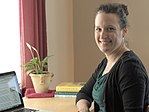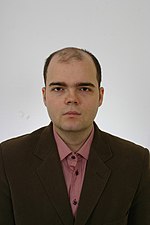WikiJournal of Humanities/Editors
WikiJournal of Humanities
Open access • Publication charge free • Public peer review • Wikipedia-integrated

www.WikiJHum.org
ISSN: 2639-5347
Frequency: Continuous
Since: December 2017
Funding: Wikimedia Foundation
Publisher: WikiJournal User Group
On social media
![]() RSS feed
RSS feed
![]() Facebook
Facebook
![]() Twitter
Twitter
![]() Mailing list
Mailing list
 |
Who is an editor?
The WikiJournal of Humanities is set up such that anyone can contribute. Minor edits, such as formatting, copyediting and minor wording edits may be done by anyone. Edits that change the meaning of the article require peer review, and should instead be added at the article's Discussion page before triggering a new round of academic peer review.
In a practical sense, the editors of each journal are organised into two groups:
- The editorial board is responsible for journal strategy, has final responsibility for ensuring that robust academic peer review is performed in a timely manner, and handles any confidential article submissions. Information about editorial board responsibilities can be found in the Editorial board page. Upon acceptance into the editorial board, editors are expected to immediately begin assisting with the submission peer review process after onboarding. If you are interested in joining the editorial board, you can apply here.
- The associate editors help in contacting prospective peer reviewers, formatting accepted manuscripts, and integrating suitable material into Wikipedia. They can also vote in board elections. Information about associate editor responsibilities can be found in the Associate editors page. If you are interested in joining as an associate editor, you can apply here.
All previous editor applications can be viewed.
Editorial board members
Frances Di Lauro ![]()
![]()
![]()
From: 26 November 2017
Fields: arts, humanities, social science, archaeology, religion, rhetoric
Dr Frances Di Lauro teaches writing and rhetoric. She teaches a for-credit unit about Wikipedia, and is currently Chair of the Department of Writing Studies at the University of Sydney.
Penny Richards ![]()
![]()
![]()
From: 26 November 2017
Fields: disability studies, women's history, historical geography, education
Gilles Sahut ![]()
![]()
![]()
From: 26 November 2017
Fields: information literacy, library and information science, media studies, education
Anne McClanan ![]()
![]()
From: 23 December 2017
Fields: art history, medieval studies, Byzantine studies
Anne McClanan is a Professor of Art History at Portland State University, and in addition to her research in medieval art also works in the development of OERs and other areas of the Digital Humanities.
Alice White ![]()
![]()
![]()
From: 29 January 2018
Fields: history of science, history of technology, history of engineering, history of medicine, labor history, modern period
Dr Alice White is a historian, Wikimedian and digital editor working at Wellcome Collection.
João Peschanski ![]()
![]()
![]()
From: 9 April 2018
Fields: political sociology, media studies, popular science
Sarah Vital ![]()
![]()
From: 10 June 2018
Fields: information literacy, scholarly communication, telecommunication, social network, social media
Sarah Vital is an academic librarian and lecturer in Business Communication at Saint Mary's College of California. Her work with students and faculty focuses on the social nature of information and questioning trustworthiness, authority, and what voices and experiences are included and excluded in the traditional and new publishing media.
Amy Fountain ![]()
![]()
From: 10 June 2018
Fields: linguistics, anthropology, endangered language, language documentation, language revitalization, participatory research
Amy Fountain is a faculty member in the Department of Linguistics at the University of Arizona. Her training is in Anthropology and Linguistics, and her research focuses on under-resourced language communities in North America, and on the development of digital resources in the context of language repatriation and community-based work.
Jack Nunn ![]()
![]()
![]()
From: 13 October 2018
Fields: participatory research, public health genomics
Jack Nunn the founder and Director of education organisation 'Science for All', working to involve people in sharing and creating in both the arts and sciences. Jack Nunn is a musician, composer and a poet. Jack is a PhD candidate in the Department of Public Health at La Trobe University
Cecelia Musselman ![]()
![]()
From: 13 October 2018
Fields: writing, science communication, scientific method, pedagogy
Spyros Koulouris ![]()
![]()
![]()
From: 3 February 2019
Fields: library science, archive, art history, archaeology, history of photography, digital humanities
Teemu Leinonen ![]()
![]()
![]()
From: 1 May 2019
Fields: education, new media, design, media studies, learning environment
Teemu is an Associate Professor of New Media Design and Learning at the Media Lab of Aalto University School of Arts, Design and Architecture in Helsinki, Finland. Teemu's research interest is New Media, especially related to applications, solutions and services of e-learning, collaborative learning, collaborative group work and creative work.
Brian McKenzie ![]()
![]()
![]()
From: 1 May 2019
Fields: active learning, pedagogy, experience, history
Brian is a lecturer in Critical Skills at Maynooth University. His background is in European history but he is also interested in pedagogical research. He uses Wikipedia in the classroom to develop disciplinary skills and information literacy.
Lionel Scheepmans ![]()
![]()
![]()
From: 9 June 2019
Fields: digital anthropology
Lionel holds a doctorate in social and political sciences. He made his thesis about Wikimedia movement within the laboratory of prospective anthropology at Uclouvain University. He is also one of the administrators on French Wikiversity. More information at this online CV.
Shani Evenstein Sigalov ![]()
![]()
![]()
From: 19 August 2019
Fields: educational technology, medical education, education, curriculum development, Wikipedia, Wikidata, digital humanities, self-regulated learning, generative artificial intelligence, lifelong learning, collaborative learning, flip teaching
Shani is an EdTech Innovation Strategist at the American Medical Program at Sackler School of Medicine, Tel Aviv University and a PhD candidate at the School of Education at TAU, focusing on Technology and Education (specifically researching Wikidata as a learning platform). Since the early 2000s, she is involved with Project Ben-Yehuda, which is the Hebrew equivalent of Project Gutenberg, and serves as Editor-in-Chief of the project, as well as Chair the charity that supports the project. More details about Shani's experience can be found here.
Thomas Shafee ![]()
![]()
![]()
From: 26 November 2017
Fields: biochemistry, protein evolution, bioinformatics, convergent evolution, protein engineering, experimental evolution, data science, data visualization, science communication
Dr Thomas Shafee is an evolutionary biochemist at the La Trobe University, Melbourne, Australia. He is involved bridging the Wikipedia-academia gap via dual-publishing projects with WikiJournals and PLOS.
Daniel Schneider ![]()
![]()
From: 1 November 2019
Fields: educational technology, information and communications technology, political science
Founder and main contributor of EduTechWiki
Associate editors
Michael Umbricht ![]()
![]()
Fields: astronomy, history of science, science outreach















